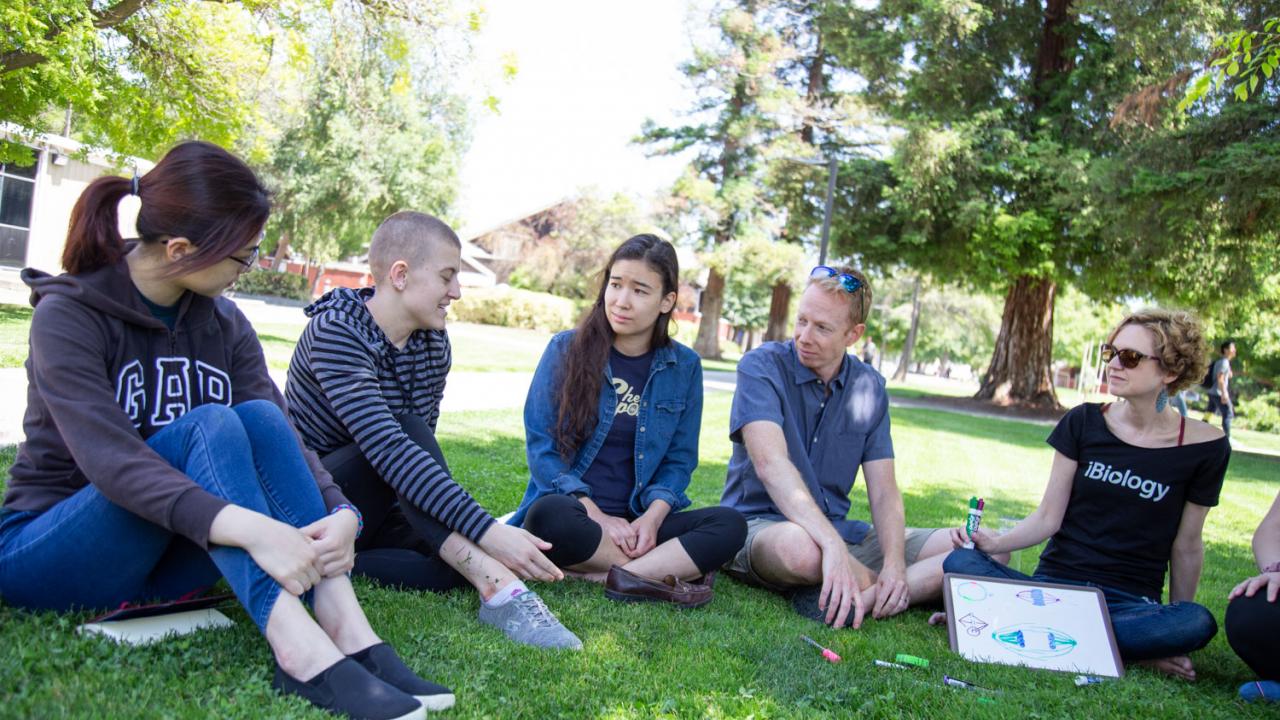
Finding a Voice in Science: iBioseminars in Cellular and Molecular Biology Encourages Student Engagement
Quick Summary
- MCB 110Y "iBioseminars in Cellular and Molecular Biology" combines at-home video lectures, produced by iBiology, with discussion-based classes
- Students watch talks from leading experts on topics like the origins of cellular life, cellular mobility and proteins
- They then prepare presentations on the lectures and discuss them as a group
As an undergraduate student at a small liberal arts college, Kassandra Ori-McKenney knew firsthand the difficulty of speaking up during lectures.
“The teacher would ask a question and I would know the answer,” said Ori-McKenney, now an assistant professor of molecular and cellular biology. “I would repeat it in my head over and over, but I would never raise my hand.”
Ori-McKenney hadn’t found her voice. But during her senior year at Vassar College in Poughkeepsie, N.Y., she enrolled in a discussion-based course with around a dozen other students. Ori-McKenney and her colleagues read recent research papers, prepared presentations on the papers and then discussed them.
“It was the first time that I actually felt empowered to share my opinion,” said Ori-McKenney. “There was no real right or wrong. It was just a discussion about the work: what you thought about it and where you thought the research was going.”
Years later, Ori-McKenney empowers her UC Davis students to speak up and share their thoughts. Teaming up with fellow faculty (and husband) Richard McKenney, assistant professor of molecular and cellular biology, Ori-McKenney and McKenney are spearheading a new iteration of MCB 110Y “iBioseminars in Cellular and Molecular Biology,” a course that combines at-home video lectures, produced by iBiology, with discussion-based classes.
This spring the duo taught the course for the first time. MCB 110Y was originally developed by Distinguished Professor Jonathan Scholey, Department of Molecular and Cellular Biology.
“Having this kind of intimate discussion section is a unique opportunity for all the students here,” said McKenney. “I hope that we can help change the way that at least a small subset of students may be thinking about how we learn about science.”
A mission to bring science to the world
The idea to reintroduce the course to the UC Davis curriculum was prompted by a meeting with Scholey, a mentor to both Ori-McKenney and McKenney. As the three caught up, Ori-McKenney and McKenney realized the class could be a great way to introduce active learning strategies to their students rather than just memorization and regurgitation. McKenney himself was familiar with the shortcomings of the memorization and regurgitation method. As a student, he found it difficult to sit down with a textbook for long hours.

“Unfortunately, a lot of science is that way because there’s so much information and there’s just no better way to disseminate that information in a short time period,” he said.
With the new class, McKenney and Ori-McKenney found they could trust the scientific credibility of content curated by iBiology, which includes talks from leading experts on many biology topics, like the origins of cellular life, cellular mobility and proteins. What’s more, there was a familiar face involved with the iBiology project. McKenney’s postdoctoral advisor, Ronald Vale, a professor of cellular and molecular pharmacology at UC San Francisco, founded iBiology in 2006. His video lecture on molecular motor proteins was part of the spring 2019 syllabus.
iBiology has “a mission to bring the world’s top scientists and their research to anyone who has an internet connection,” said Ori-McKenney.

Taking the time to think critically
Over the course of the spring class, the six students of MCB 110Y learned the basics of cell biology, prepared presentations on the lectures and then discussed them in class with Ori-McKenney and McKenney. Among the class were Samantha Wallace and Madeleine Beans, both seniors majoring in Genetics and Genomics.
“It’s not going and sitting and listening to a teacher or a professor,” said Wallace. “You watch the lectures beforehand online and then we go and we talk about it and we can ask any questions, any curiosities. We can branch off from there in any way we want, which was really great.”
“The ability to discuss research in science is really, really critical,” said Beans.
“That’s going to be very useful both in classes, in studying with people but especially in professional life because that’s what you need to be doing,” she added. “You need to work with other people.”
Ori-McKenney and McKenney plan on teaching MCB 110Y again next spring.
“This course is really built for people who want to take that next step to make science a full-time commitment or career,” said McKenney. “So we’re looking for students who are…strongly motivated to take that next step into going past the textbook, going past the exam and saying ‘I want to learn what’s going on at the cutting-edge of science.’”

